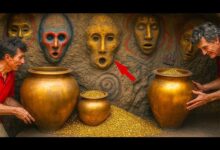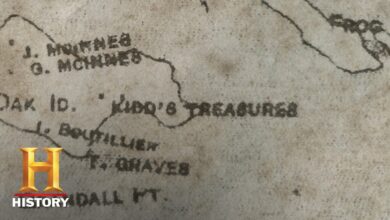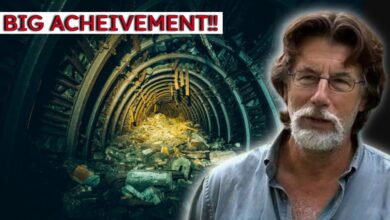Rick Lagina Unlocks Secret Chamber Hiding Gold Bars Worth $250M In oak island!
Rick Lagina Unlocks Secret Chamber Hiding Gold Bars Worth $250M In oak island!

Rick Lagginina has done the unthinkable. Deep beneath Oak Island, after centuries of rumors, dead ends, and heartbreak, a hidden chamber has finally been breached. Inside, stacked in silence, untouched for generations, lie gold bars worth a staggering $250 million. A discovery powerful enough to rewrite everything we thought we knew about Oak Island.
But the real question is, how long can such a secret remain hidden now that it’s been unleashed? And if you want to witness how it all unfolds, hit that like button and subscribe right now.
The summer had been long, brutal, and uneventful until the scanners started humming. Late night seismic surveys around the money pit revealed strange anomalies beneath the earth. Hollow echoes that defied explanation. For Rick Lagginina, this wasn’t just a reading on a screen. It was destiny calling.
He had chased Oak Island’s riddles for decades. And now, staring at those jagged seismic patterns, he felt the island itself whisper, “Come closer.”
The locals had warned him, as they always did, stories of pirate captains sinking their loot into the mud. Of Spanish gallions lost to storms and buried in secrecy, of the Knights Templar who carried not just gold but sacred relics across oceans to hide them in this very soil.
Most dismissed them as bedtime stories, but now those whispers were clawing their way back to life. At night, the crew noticed it, too. The way the ground trembled as if hollow veins pulsed beneath their boots. Heavy equipment picked up echoes, the sort of resonance you’d expect from caves, not solid earth. Even the skeptics grew uneasy. Something about the island’s air changed, thickening with a presence they couldn’t name.
It was as though Oak Island itself was alive, waiting, watching. Rick couldn’t shake the thought. This was no longer about finding treasure. This was fate carved long before his birth, demanding he step into the story he was destined to finish.
Then, without warning, the earth answered. Excavation near shaft 9 should have been routine. But with a groan and a crack, the ground beneath the rig collapsed, swallowing tools and leaving a jagged opening no map had ever shown.
Dust and rock cleared, and there it was, a narrow passage shimmering with mineral deposits, its walls almost glowing in the torch light. It didn’t look natural. It looked sealed. Rick crouched close, running his hand over the limestone. When the hammer struck, the sound wasn’t dull. It was hollow, like knocking on the lid of a coffin.
Marty argued it could be a fissure, a natural split in the rock. But Rick shook his head. The walls were too precise, the angles too exact. Nature doesn’t carve geometry. Men do. Stranger still was the metallic dust clinging to the stone like filings left behind from tools. Someone had worked this rock. Someone had sealed it with intention.
The realization settled over them like fog. This wasn’t a dead end. It was a doorway.
The theory spread among the crew like fire. Oak Island wasn’t one vault, one chamber. It was a labyrinth, a carefully designed system meant to outlast centuries, to mislead the unworthy and reward only the persistent.
When they pushed deeper into the exposed passage, their lights caught something extraordinary. Symbols carved into the stone walls, faint but undeniable—crosses, circles, cipher patterns etched with hands that belonged to another age.
Alex Lagginina’s voice trembled as he pointed. He’d seen this before in Portugal, in southern France. They weren’t random. They were Templar. Some of the carvings aligned in deliberate clusters almost like coordinates. Scholars might one day call them a code, a breadcrumb trail leading deeper.
For the crew, it meant only one thing. This was no accident of geology. They were inside a puzzle, one crafted by men sworn to secrecy, determined that only those who could read their language would ever unlock what lay ahead.
And as Rick stood in the glow of those torchlit symbols, a realization struck him. It wasn’t gold alone that Oak Island was guarding. This place was something greater. A sanctuary, a spiritual stronghold where relics, forbidden knowledge, and riches beyond imagination had been hidden away from the world.
That thought didn’t stop him. It pushed him forward. The deeper they pressed into the newly exposed corridor, the island seemed to resist their progress, as if testing whether they deserved to proceed.
The rough passage suddenly ended at a slab of stone so vast it filled the width of the chamber. Embedded into its surface were thick iron clamps, rusted but still holding firm, each one driven so deep into the rock that it looked impossible to remove.
The slab wasn’t the haphazard collapse of natural stone. It was deliberate, calculated. Tool marks ran in lines and arcs, scars left by men who had shaped this barrier with purpose, as though daring anyone centuries later to challenge their craftsmanship.
Rick ran his hand across the cold surface, the grooves biting into his fingertips. He ordered sound tests, and when the hammer struck, the chamber filled with an unnatural metallic echo that reverberated far too long. The slab was not solid. Something vast and hollow lay beyond it. A cavity, a chamber, proof that they were on the edge of breaching something untouched for hundreds of years.
The whispers began almost immediately. Curses, traps, the old warnings about Oak Island’s deadly defenses. One crew member muttered about the infamous flood tunnels designed to drown intruders in seconds, while another recalled collapse chambers, stone set loose to crush the reckless. Some claimed they could feel the air shifting already, as though the island itself was preparing its defense.
Yet, while the men hesitated, Rick did not. To him, this wasn’t just a wall. It was a gateway, a threshold between centuries of rumor and the moment of truth.
The battle against the slab lasted for days. Excavation machinery clawed at its edges while chisels chipped away relentlessly. The noise was deafening, echoing across the island like a war drum announcing an invasion. Every strike seemed sacrilegious, as if they were attacking the past itself. Still, they pressed forward.
Slowly, cracks spidered across the surface, releasing faint gusts of air so ancient it carried the taste of stone and dust on their tongues. The air was dense, suffocating, cold. It smelled of centuries sealed in darkness.
Each time the slab gave way a little more, the tension among the men grew. They spoke in hushed tones of the island’s curse, of the prophecy that seven lives must be claimed before the treasure could be revealed. Already too many had perished across the decades. Some feared they were about to tip the balance.
Rick ignored them. He bore the weight alone. This was his responsibility, his obsession, and no superstition was strong enough to hold him back.
Then came the moment. With a groan that rattled their bones, the slab shifted. Dust rained down as the clamps gave way, and the barrier leaned forward like a Titan surrendering. The sound was thunderous as it toppled, scraping against the walls, crashing into the floor with a final roar.
And in its wake yawned a blackness so absolute it seemed to devour the light from their lamps. The void stretched ahead, an invitation and a warning all at once.
Caution overtook excitement. They lowered a camera on a cable, its small lens cutting into the darkness. At first, nothing. Then the feed flickered, catching glimpses that made their hearts seize. Arches carved with impossible precision, vaulting over stone floors too straight to be natural.
This wasn’t a cave. This was architecture, proof—undeniable and clear—that men had built this chamber by hand with knowledge and intent.
No longer able to wait, Rick led the descent himself. They followed cautiously, their boots testing every inch of ground before committing to each step. The staircase that greeted them had been hewn directly into the stone, a spiral curling downward, worn smooth by water and time.
Slippery with centuries of condensation, every step threatened to throw them into the abyss. Lantern light clung to the walls, revealing streaks of mineral buildup that shimmered faintly, almost like veins of silver.
The air grew thicker as they descended, damp and suffocating. Each breath was heavy, filled with the taste of stone long entombed. Dust swirled in the beams of their lights, creating illusions of movement, as if ghostly figures lingered in the dark, drifting just beyond reach.
Every sound carried an echo that returned distorted, like whispers layered over whispers. It was no longer a simple descent. It was trespass, a violation.
The silence pressed against them the deeper they went. There was no drip of water, no scuttling of insects, nothing alive in this space, only the hollow thud of boots, the hiss of strained breaths, and the occasional rasp of stone underhand.
The weight of the island bore down on them, suffocating and unyielding. For a moment even Rick hesitated, his resolve tested by the oppressive atmosphere that seemed to warn them back. But step by step they pressed on.
At the base of the staircase, the darkness opened into a platform before yet another door. This one was no crude barrier, but a work of mastery. A vast slab of oak and iron bound together, reinforced with bolts the size of a man’s wrist. Hinges so massive they could only have been forged in the age of knights and castles.
It towered before them, unyielding, solemn, as though daring them to try again. They stood silent before it, lantern light flickering across its scarred surface. This was the true threshold, the line between legend and revelation. The men felt it in their bones. Whatever lay beyond was not simply treasure. It was history itself, waiting in the darkness.
As they stepped closer, the massive ironbound door revealed its defiance. Its surface, though battered by centuries, carried warnings carved deep into the metal itself. Latin inscriptions emerged in the wavering light.
Non apparay — do not open.
Beneath it, another phrase cut with unnerving precision: Kustos infinitus — the eternal guardian.
These were no idle scratches of scavengers. They were deliberate warnings meant to echo across ages. Rick ran his fingertips along the grooves, the ancient letters cold and sharp against his skin.
Then the date caught his eye. 1347 — the year Europe drowned in plague, when fear consumed cities and entire regions were reduced to silence. Historians had long suggested the Black Death drove secretive orders to bury their treasures far from civilization.
Could this chamber have been sealed not only to protect riches, but to imprison something darker, something never meant to resurface?
Theories buzzed among the men like hornets. Some whispered of relics infected with pestilence or artifacts cursed by association with death. Others insisted this was no plague vault, but a sanctum built by men sworn to secrecy, the Knights Templar or their successors, meant to guard sacred relics too dangerous for the outside world.
Religious iconography mingled with Masonic-style engravings across the door. Strange crosses entwined with geometric patterns that seemed more code than decoration. It felt less like a barrier and more like a covenant, a pact etched in stone to keep the unworthy at bay.
Rick lingered in the silence, torn between awe and dread. His heart hammered with the weight of the moment. Behind this door lay either validation of a lifetime’s pursuit, or a reckoning no man was prepared for.
The others watched him, waiting. He knew there was no choice left. The island had called him here, and now it demanded he step through.
The work began, iron grinding against iron as ancient bolts resisted with all their strength. The hinges shrieked with protest as crowbars dug and drills roared. Hours passed, each sound echoing like a dirge in the hollow stairwell above.
The men grew quieter, almost reverent, as if sensing they weren’t just breaking a lock, but unraveling a vow.
When the final bar fractured, the sound cracked like thunder, a noise so loud it seemed ceremonial, an announcement that the past had surrendered.
With strained effort, they heaved against the massive door. At first, it shuddered, then groaned, then finally moved. The hinges screamed a metallic wail after centuries of silence as darkness spilled forward with the weight of a tangible force.
The air that poured out was dense, stale, carrying the taste of earth and incense and something indefinably old.
Their lanterns pushed into the void, revealing contours that stole the breath from their throats. The chamber beyond was no crude vault. It soared upward into a vaulted ceiling supported by arches carved with deliberate symmetry.
The walls glistened faintly, lined with stacked stone chests and elongated containers shaped like reliquaries. Every angle spoke of design, not desperation. This was not a hidden stash, but a sanctum engineered with purpose, built to endure the collapse of kingdoms and the forgetting of empires.
The men entered slowly, their boots crunching over stone untouched for centuries. The silence here was different, thicker, reverent, as if the chamber itself demanded hushed voices.
Awe gripped them, a solemn recognition that they were standing where no living soul had stood for perhaps 700 years. The chamber did not feel like a vault. It felt like a cathedral, a place meant not only to hold wealth, but to sanctify it.
And then came the moment none of them would ever forget. Rick approached the nearest chest, his hands trembling as he forced the rusted clasp. With a creak that echoed like a scream, the lid split open.
What lay inside blazed even in the dim lantern glow: bars of solid gold stacked in neat rows, each one the size of a man’s forearm.
The glow they cast was faint yet mesmerizing, gilding the chamber with a shimmer like captured firelight. Gasps broke the silence. Rick reached inside, lifting one bar, its weight pulling against his arms.
The surface bore markings—crosses, foreign seals, and runes that seemed to defy identification. Each bar was stamped with proof that it had been forged with intent. Not raw plunder, but sanctified wealth.
The chest was full, and when others were forced open, the revelation grew staggering. Crates upon crates, stacked in solemn order, brimming with gold. Enough to bankroll crusades, to topple dynasties, to fuel empires.
Later, experts would estimate the combined value at more than $250 million. But in this moment, the number meant nothing. What mattered was the proof. Generations of failure, of death, of mockery and obsession—all vindicated in one blinding truth.
The treasure was real. Oak Island had finally given up its secret.
The men stood motionless, the only sounds their ragged breathing and the faint crackle of lantern flames. For decades, Oak Island had consumed their lives, dangling its mystery like a cruel riddle. And now, for the first time, that riddle had begun to answer itself.
Rick held the gold in his hands, his voice breaking the silence with words he had carried for a lifetime.
“We’ve unlocked the secret of Oak Island.”
His words echoed across the chamber, swallowed by the arches above.
But even as the weight of treasure pressed on them, another truth surfaced. The gold was not the whole of it. Something else waited in the dark, something older, deeper.
The chamber’s breath was thick with history, every corner pressing down with a weight that felt older than the island itself.
When the chests that did not gleam with gold were pried open, the contents proved more staggering than fortune. Scrolls carefully bound in linen, their seals of wax cracked but still intact after centuries.
Handling them was an act of reverence. Each parchment fragile as cobwebs, yet resilient enough to bear testimony. The writing upon them, Latin scripts inked in a hand clearly accustomed to secrecy, spoke of voyages long erased from the sanctioned chronicles of history.
Diagrams of ships traced across the parchment, routes charting across the Atlantic—not from Spain or Portugal of the 15th century, but from earlier, wilder centuries. Oak Island was marked not as a solitary enigma, but as a node in a grander design, a waypoint in a lattice that stretched between Jerusalem, the coastlines of Scotland, and the ports of Portugal.
And then, among the bundles of parchment, Rick lifted something heavier. A seal carved into wax, hardened like stone, unmistakably bearing the crest of the Knights Templar.
That single impression bound the documents to centuries of legend. Proof that the whispers tying the order to Oak Island were not fantasy, but deliberate truth hidden in the shadows of time.
Even more, some maps hinted at further repositories—vaults that might still lie sealed beneath foreign soil, waiting as Oak Island had waited.
The chamber no longer whispered of wealth alone. It thundered with implications, rewriting the very architecture of history.
What sat before them was not treasure, but conspiracy made tangible, a revelation spanning continents and faiths, kingdoms and centuries.
Yet, as gold and scrolls glimmered in the lantern light, unease seeped into the crew. For word of such a discovery was impossible to silence.
Boats began appearing offshore. Silent silhouettes anchored beyond the reach of the tides, their lights extinguished, yet their presence undeniable. Men watched from the treeline, strangers who vanished when approached, but their footprints pressed fresh into the soil.
With each dawn, the sense of unseen eyes grew heavier. Fences rose, guards patrolled, and still the air vibrated with tension. Some intruders were bold enough to step onto the island, demanding access, claiming the vault’s contents as the inheritance of their order, their nation, their church.
To them, Rick was no discoverer, but a thief who had trespassed upon legacy.
Arguments sparked even within the team. Some whispered that to hoard the treasure was to repeat the sins of those who hid it. Others feared that to reveal it would be to unleash chaos into a world unprepared for truths so destabilizing.
Governments began circling like vultures. Journalists pressed for confirmation and scholars demanded transparency. Rick himself became the fulcrum of a moral dilemma. Was he a preserver of history, or had he—in lifting the slab and breaching the chamber—stolen from it?
The weight of $250 million in gold was tangible, but the weight of history was infinitely heavier. The curse of Oak Island, it seemed, was not merely death, but possession. The impossible burden of ownership that turned discovery into damnation.
And yet, beneath all the fear and conflict, triumph rang undeniable. The gold stacked in precise bricks along the chamber floor was proof enough to silence centuries of doubters. No longer could Oak Island be dismissed as folly, its legends mere tavern tales. The reality glimmered in cold, heavy metal, a fortune enough to finance armies, to build cathedrals, to topple kings.
But it was the scrolls, the seals, the manuscripts that truly reshaped the world’s understanding. They suggested Oak Island was never the end of a story, only its prelude. Each parchment spoke of networks, guardians, and legacies deliberately scattered to keep a secret too powerful to remain in one place.
For Rick, the revelation was personal as well as historic. He felt not as though he had conquered Oak Island, but as though the island had chosen him to bear its truth. Every hardship, every empty shaft, every near collapse had led inexorably to this moment—to his hand upon those golden bars and ancient seals.
He was not simply the man who found Oak Island’s treasure. He was now its custodian, its guardian, bound by the weight of secrets as much as by the gleam of gold.
The chamber with its gold and parchments did not merely enrich him. It transformed him.
As the crew resealed the entrance behind them, the knowledge of what they carried forward burned brighter than any fortune. They knew the world would never see Oak Island the same way again.
It had ceased to be rumor and had become revelation. It had shifted from myth into history, from mystery into a living legacy.
Yet, even as the chamber’s darkness reclaimed what was left behind, one truth remained pressing upon Rick’s heart.
Oak Island was not finished. What they uncovered was monumental, yes, but it was also a doorway. The real secret, the true design of those who hid the gold, the maps, the scrolls, still pulsed somewhere deeper—in vaults yet untouched, in legends yet unproven.
Oak Island’s greatest mysteries had not been solved. They had only been awakened.








